An overview of gender parity in Bahrain: Progress, challenges, and the path forward
On July 12th, 2023 the Atlantic Council’s empowerME Initiative, in collaboration with the U.S. Embassy in Manama and Bahrain FinTech Bay, held a first workshop in a series of four events for the Win Fellowship’s first cohort launched in Bahrain in June. The event, which took place both in-person at Bahrain FinTech Bay offices and virtually, focused on female leadership in the country.
The opening notes were delivered by empowerME’s chairman Amjad Ahmad. Keynote remarks were provided by H.E. Shaikh Abdulla Bin Rashid Al Khalifa, Ambassador of the Kingdom of Bahrain to the United States, and David Brownstein, Deputy Chief of Mission at the U.S. Embassy in Manama.
The event encompassed a moderated discussion featuring esteemed panelists: Jordana Semaan, Head of Human Resources (Gulf and Asia), Global Head of DEI, Investcorp; Nidal Al-Basha, Head of Public Sector Innovation, Amazon Web Services MENA Region; Hollie Griego, Global Wealth Investments North America Head of Strategy & Platforms, Citi; and Marwa Al Saad, Executive Director at Human Capital, Mumtalakat Bahrain, with Suzy Al Zeerah, Chief Operating Officer, Bahrain FinTech Bay, skillfully moderating the session.
These panelists shared profound insights on the current state of gender equality in Bahrain, the successful initiatives and strategies propelling this progress, the remaining challenges, and the influential role of corporate initiatives in endorsing gender equality and promoting women’s leadership within Bahrain’s business landscape.
Key discussion points
Amjad Ahmad, Chairman of the empowerME initiative at the Atlantic Council kicked-off the event by introducing the remarkable achievements of Bahraini women in education, workforce, and politics. Women in Bahrain make up 83 percent of tertiary school enrollments, 54 percent of the public sector workforce, and 45 percent of leadership positions in official state agencies. In the private sector, women comprise 35 percent of the workforce, hold 17 percent of board seats, and occupy 35 percent of managerial roles. The political landscape is no different, as Bahraini women made major strides. They make up 20 percent of the total members of the Council of Representatives and 25 percent of the Shura Council. Ahmad emphasized that these achievements are the result of a number of factors, including government policies that promote gender equality, the strong educational attainment of Bahraini women, and the increasing participation of women in the workforce.
In his opening remarks, Ambassador H.E. Shaikh Abdullah bin Rashid Al Khalifa expressed his strong support for the WIn Fellowship, noting its role in exposing Bahraini top women entrepreneurs to life-changing networking opportunities, mentorship, and workshops, thereby increasing their economic participation. He also highlighted the significance of the transformation brought about by the Supreme Council for Women (SCW Bahrain), which has been instrumental in implementing legislative and societal safeguards for Bahraini women. As a result of these reforms, Bahraini women account for about 43 percent of the labor force. Continued progress is being made in areas of pay equity, entrepreneurship, pensions, and the enhancement of women’s physical and psychological well-being. Furthermore, His Highness underscored Bahrain’s commitment to digital inclusion, manifested in the government’s initiatives to train women in digital skills and motivate them to pursue STEM fields.
David Brownstein expressed his support for the WIn Fellowship, asserting, “we’re incredibly proud to support the WIn Fellowship here in Bahrain. Bahrain is a place where seeds flourish when planted.” He also pointed to the shared goals between the U.S. Embassy and the Bahraini government, with both parties aiming for a peaceful and prosperous state. “Achieving this requires the active participation of all society’s members”, he noted. He also affirmed the U.S. Embassy’s commitment to supporting Bahrain’s national strategy on gender equity and addressing inequality.
The panelists all agreed on Bahrain’s success in promoting women to all levels of the workforce and representation in government and boards, attributing this to both government reforms and a workforce that acknowledges women’s potential. They also recognized persisting challenges, like widespread biases against women, underscoring the necessity of a robust peer-to-peer network of women advocating for each other.
When asked about the factors that have contributed to Bahrain’s high ranking in gender parity among Arab countries, Nidal Al Basha stated several key aspects. Firstly, he mentioned the role of encouraging women to pursue STEM spatializations, which has been instrumental in promoting gender equality. Additionally, he emphasized on the importance of a supportive work environment that grants women extended maternity leaves, ensuring a balance between their professional and personal lives. Al Basha explained that Bahrain offers additional benefits for women, such as dedicated nursing rooms in the workplace, demonstrating a commitment to meeting their specific needs. The implementation of inclusive hiring and promotional policies also plays a significant role in enabling women to succeed and advance in their careers, according to Al Basha.
Marwa Al Saad emphasized further how Bahrain recognizes the immense value of human potential, considering it as one of the most valuable and inexhaustible resources. She stated that the high gender parity in Bahrain is attributed to various factors. “There is a mindset shift in the country that prioritizes growth and development, fostering an environment where both men and women can flourish,” she explained. Bahrain has also implemented robust policy and program reforms that establish a solid foundation for the advancement of all genders. These initiatives created equal opportunities and a supportive framework for individuals to thrive in various sectors. Al Saad also mentioned an exciting new initiative; the Bahrain Defense Force, which further demonstrates Manama’s commitment to gender parity and inclusivity. This initiative showcases the country’s dedication to providing equal opportunities and encouraging the participation of all genders in defense-related fields.
Jordana Semaan, from her side, mentioned that the one lesson that other countries in the region can learn from Bahrain is the emphasis placed on women and celebrating their success stories. “The importance of representation cannot be understated, as it serves as a significant motivator for other women to enter the workforce and unlock their full potential”, she said. By showcasing accomplished women and their achievements, Bahrain inspires and encourages others to pursue their goals and make significant contributions in their respective fields.
Hollie Griego focused on the importance of allyship among women, highlighting how it empowers and propels them into higher positions within the workplace. “Citi, following a similar approach to Bahrain, recognizes the significance of recruiting, training, and retaining women in its workforce” according to Griego. She pointed to the implementation of mechanisms that create an environment where women can thrive, allowing them to strike a balance between their roles as working mothers and providing the flexibility necessary to forge a successful career path leading to long-term security. These mechanisms serve as valuable examples that any country can adopt to promote gender equality and support women’s advancement.
Additionally, the panelists discussed the changing perception towards women in tech sectors, demonstrated by the increased hiring of female engineers at Amazon Web Services. They gave the example of the vital role supportive mechanisms at the workplace play in facilitating women’s advancement into senior roles, enabling them to balance their roles as working mothers. The importance of role models was also stressed, regardless of gender.
When asked about the challenges faced by Bahraini women, similar to women globally, Semaan referred to a UNDP report stating that 9 out of 10 people hold biases against women. This bias is present in both men and women, and is a significant obstacle to overcome. Semaan explained the importance of alliances and support networks among women, highlighting their role in addressing these challenges. “In this region, there is still a cultural expectation for women to take on caregiving roles,” she pointed.
Al Saad further emphasized the importance of implementing gender-inclusive solutions to address these challenges, while Al-Basha focused onthe importance of mental health support for both women and men, as well as the significance of programs that help women re-enter the workforce after being on leave.
Griego acknowledged that while Citi is one of the few institutions with a female CEO, there is still much work to be done to address the gender pay gap at senior levels and promote women into those roles. She emphasized the significance of mentorship for women, as it plays a crucial role in guiding them through their professional journey and career growth.
Suzy Al Zeerah additionally pointed to the absence of sufficient female role models and mentors in Bahrain and in the Middle East in general.
Closing remarks
According to the Global Gender Gap Report 2023, Bahrain stands as the second highest in terms of gender parity among the Arab countries. This achievement is due to several important themes that have emerged throughout the discussion.
The commitment to supporting working women, as evidenced by extended maternity leave suggests an understanding of the importance of balanced work-life dynamics. This is also apparent in private sector policies, especially in terms of maternity leaves like in the case of Amazon Web Services, among others that are trying to create an enabling workplace for women to join. Research did actually prove that paid maternity leave increases women’s labor force participation and entrepreneurship, thus affecting the country’s’ economy in general.
An equally significant development in Bahrain’s gender equality journey is the strategic emphasis on digital inclusion and the promotion of women in STEM fields. Bahrain is a frontrunner in technological diversity in the MENA region. Digital activities contributed to 8% of Bahrain’s gross domestic product (GDP) in 2020, demonstrating the nation’s committed efforts towards enhancing digital inclusivity. As for the digital gender disparity, it is minimal in internet access (1.1 percent), while none-existent in mobile accessibility.
Furthermore, around a third of the broader ICT workforce in Bahrain are women and approximately 20 percent of startup founders are women, higher than the global average. Given the traditionally low representation of women in the global tech sector, Bahrain’s encouragement of female participation is a drastic step towards a more balanced gender equation.
Role models and allyship were discussed during the workshop. Both are important for women’s economic advancement. Afterall “you can’t be what you can’t see”. Championing female leaders in sectors such as tech and defense can potentially disrupt existing barriers, opening doors for future generations.
Despite this progress, Bahraini women, like many in the region, continue to face a variety of legal, regulatory, and sociocultural obstacles to economic participation and leadership. Initiatives to address this discrepancy are necessary for future growth and development. These barriers highlight the need to invest in women skills, establish strong networks, and develop clear metrics to measure progress in supporting women.
The private sector plays a key role in improving the condition of women and increasing their leadership. For example, the gender pay gap in Bahrain is prominent in the private sector-US$2,300 versus US$1,700 for women compared to only US$200 in the public sector-. Institutions need to actively work towards increasing female representation in leadership, by prioritizing the recruitment, training, and retention of women, play a critical role in creating a more equitable business landscape, concluded the speakers.
The discussion overall underscored Bahrain’s commitment to gender equality and its innovative approach to tackle this issue. However, it also highlighted the persistent challenges that need to be addressed to ensure lasting progress. The workshop served to place Bahrain’s journey as an inspiring model for other nations grappling with similar issues.
Lynn Monzer is the Associate Director with the Atlantic Council’s empowerME initiative at the Rafik Hariri Center for the Middle East.
Nibras Basitkey is the Program Assistant with Atlantic Council’s empowerME initiative at the Rafik Hariri Center for the Middle East.
WIn Fellowship cohorts
Related content


empowerME
empowerME at the Atlantic Council’s Rafik Hariri Center for the Middle East is shaping solutions to empower entrepreneurs, women, and youth and building coalitions of public and private partnerships to drive regional economic integration, prosperity, and job creation.
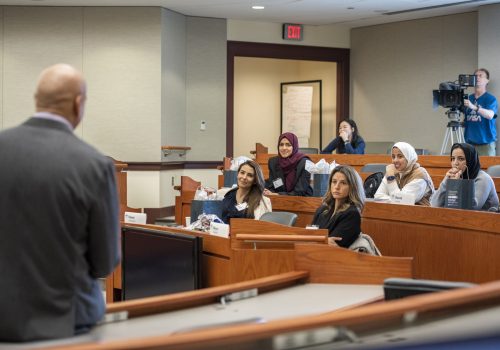
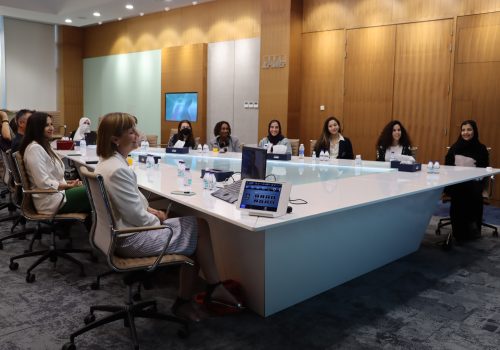
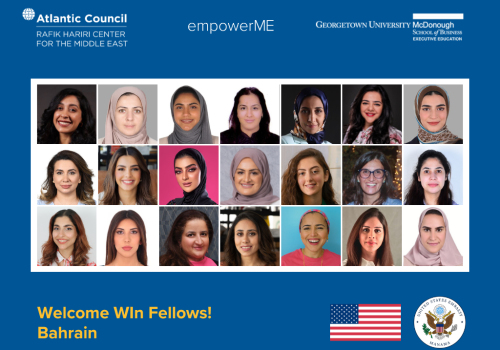
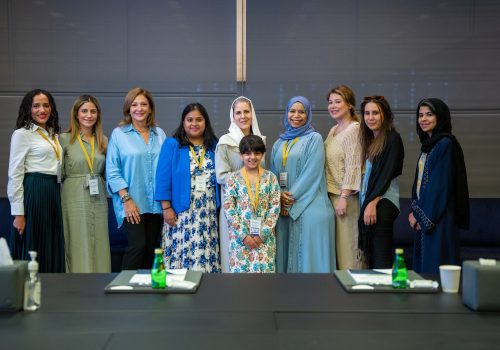
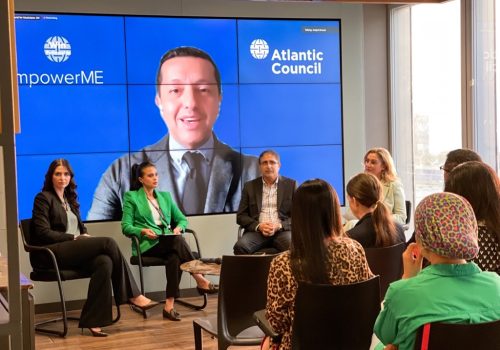
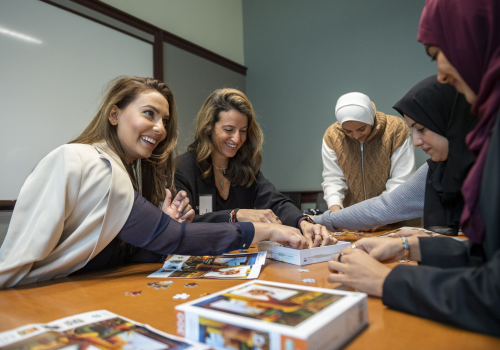
Follow the conversation on social media using #ACempowerME